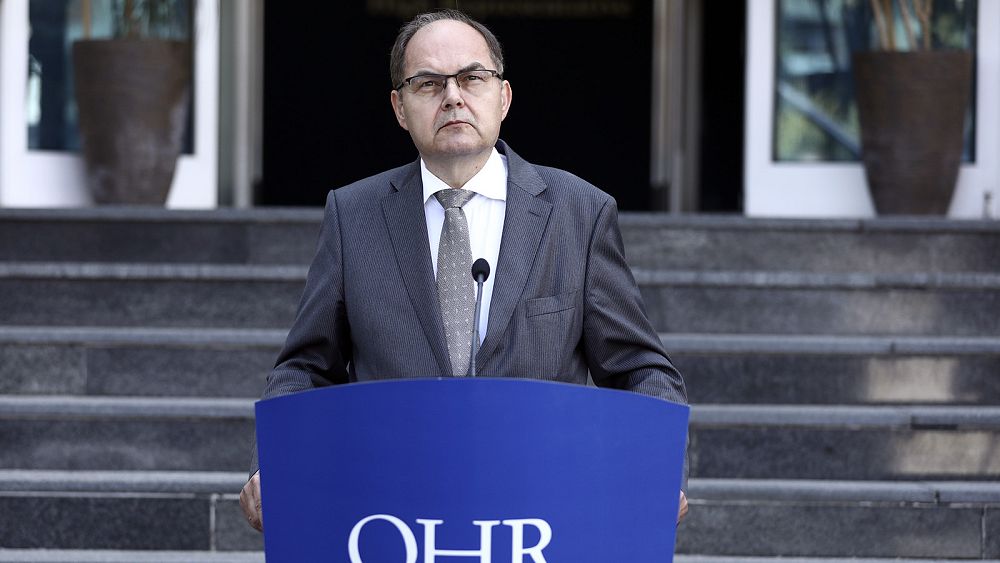
The chief international peace envoy in Bosnia is warning that the small Western Balkan nation could face the biggest “existential threat of the post-war period” if the international community does not curb threats of separatist actions by Bosnian Serbs.
In a report scheduled for delivery to the U.N. Security Council this week, High Representative for Bosnia and Herzegovina Christian Schmidt said that “the prospects of further division and conflict are very real,” if Bosnian Serb leader and member of the country’s threeway presidency Milorad Dodik withdraws ethnic Serb troops from the Bosnian army and creates a separate Bosnian Serb force.
Those moves and other threats, if carried out, would “ultimately undermine the state’s ability to function and carry out its constitutional responsibilities,” Schmidt wrote, according to excerpts of his report carried by Bosnian outlet, Klix.ba.
Schmidt, a senior German diplomat, called Dodik’s threatened actions “tantamount to secession without proclaiming it.” He said they “endanger not only the peace and stability of the country and the region, but – if unanswered by the international community – could lead to the undoing of the agreement” that ended the Bosnian War in 1995.
Dodik responded Tuesday by dismissing the report as “a propaganda pamphlet” that was written to “favour Bosnian Muslims.”
The Bosnian War started in 1992 amid the breakup of then-Yugoslavia, when Bosnian Serbs, with the help of the Yugoslav army, tried to create ethnically pure territories with an aim of joining neighbouring Serbia. Simultaneously, Bosnian Croats also proclaimed their own parastate, backed by another neighbour, Croatia.
More than 100,000 people were killed, and millions were left homeless during the worst bloodshed in Europe after the Second World War.
The war pitted Bosniaks, who are mostly Muslims, Serbs, who are of nominal Orthodox Christian faith, and Croats, or Catholics, against each other and ended with the US-sponsored peace agreement in 1995 that created two administrative units called entities within the country, the Serb-dominated Republika Srpska and the Bosniak-Croat majority Federation of Bosnia and Herzegovina.
The Office of the High Representative was also established at the same time to act as an arbiter on the implementation of the civilian part of the peace deal.
The two entities were given some autonomy, with an umbrella state-level government in place as well. The army, the top judiciary, intelligence, and tax administration are governed by state-level institutions. Bosnia also has a three-member presidency made up of members representing each of the three dominant ethnic groups.
Dodik has been advocating for the separation of the Bosnian Serb mini-state and having it become part of Serbia for years. Such a move would unlikely win support from the United States and much of the West.
Dodik, who has tacit support from Russia and allies in Serbia, recently intensified his campaign, pledging that the Republika Srpska parliament would declare the creation of its own army, tax authority, and intelligence agency by the end of November.
He has threatened to take over the Bosnian army barracks located in the Republika Srpska once the Bosnian Serb military is formed. He said that if the West tries to intervene, he would call Bosnian Serb “friends” for help, an apparent reference to Serbia and Russia.
A U.N. Security Council session where Schmidt was to deliver the report was originally scheduled for Tuesday but was postponed until later in the week. Extending the mandate of the EUFOR peacekeeping mission in Bosnia, also known as Althea, by one year is also set for consideration by the Security Council.
Russia has threatened to veto the resolution approving the extension unless all references to the High Representative for Bosnia and his office were removed – an apparent attempt to undermine Schmidt’s authority as the observer of the 1995 peace deal.
THE ROTTEN FISH: CAN OF WORMS OPENED OF APC & TINUBU'S GOVERNMENT OVER NIGERIA'S ECONOMIC DOWNTURN
WATCH THE CRITICAL ANALYSIS AND KNOW THE RESPONSIBLE PARTIES TO BLAME FOR NIGERIA'S ECONOMIC CHALLENGES, WHILE CITIZENS ENDURE SEVERE HARDSHIPS.Watch this episode of ISSUES IN THE NEWS on 9News Nigeria featuring Peter Obi's Special Adviser, Dr Katch Ononuju, 9News Nigeria Publisher, Obinna Ejianya and Tinubu Support Group Leader, McHezekiah Eherechi
The economic crisis and hardship in Nigeria are parts of the discussion.
Watch, leave your comments, and share to create more awareness on this issue.
#9NewsNigeria #Nigeria #issuesInTheNews #politics #tinubu THE ROTTEN FISH: CAN OF WORMS OPENED ...
DON'T FORGET TO SUBSCRIBE AND LEAVE YOUR COMMENTS FOR SUBSEQUENT UPDATES
#9newsnigeria #economia #economy #nigeria #government @9newsng
www.9newsng.com
